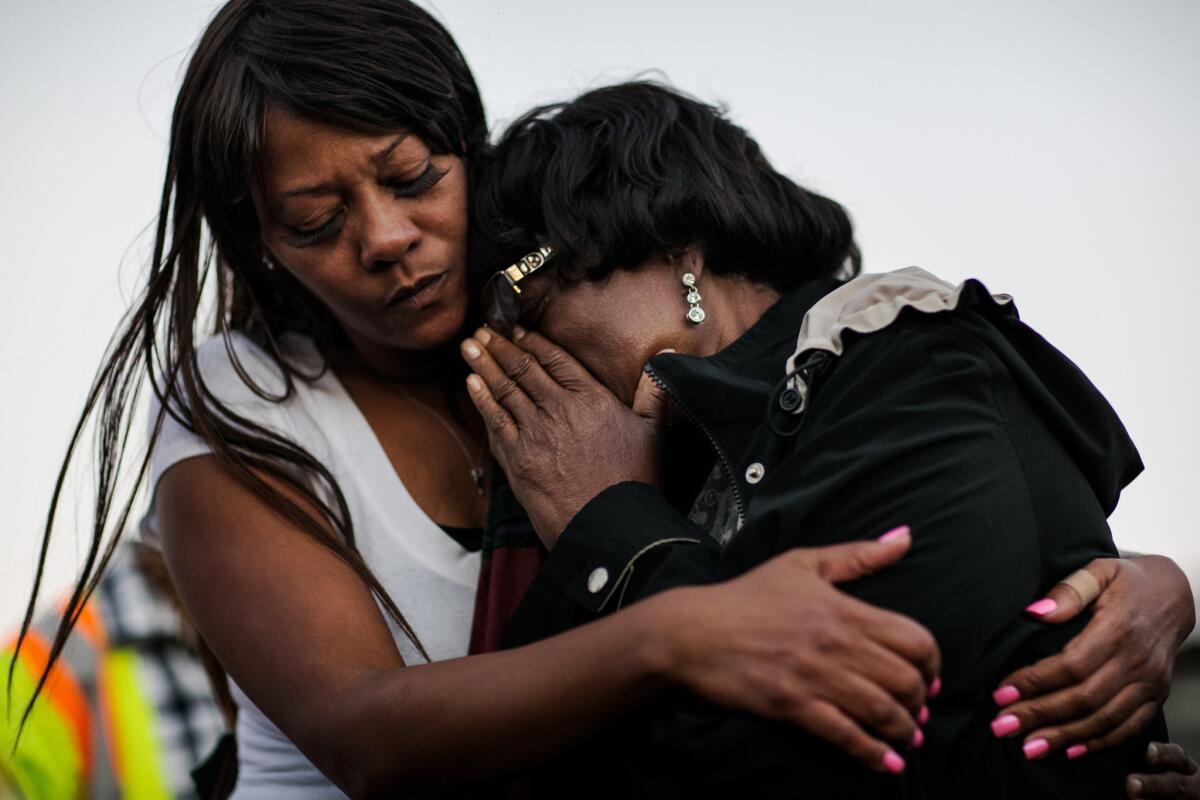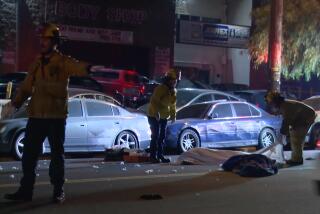As L.A. sees deadliest August in 8 years, LAPD scrambles to put more officers in hard-hit areas

Catherine Mazzucco, right, mother of Marcus McClendon, 52, breaks down during a vigil at the spot where McClendon was shot.
Catherine Mazzucco awoke recently to pounding on her door.
A friend of her son was standing on the front step, panting. Someone had shot her son, he said.
Mazzucco and her daughter followed panicked screams as they rushed to where Marcus McClendon, 52, was on the sidewalk, lying in his own blood. He died soon after the shooting.
“I never thought someone would come for my son,” his mother said.
His shooting three weeks ago in South Los Angeles was one of 39 homicides in the city last month, making it the deadliest August since 2007, when 41 people were slain.
Until now, homicides had remained flat through much of the year — a bright spot as other violent and property crime rose throughout the city. But after last month’s killings — fueled largely by gang violence in South L.A. — homicides are up citywide by nearly 7% since the start of the year, compared with the same period in 2014, according to LAPD data.
Across the city, 185 people had been killed through Saturday. And at least one other homicide occurred since then: the shooting of a 26-year-old homeless man on the Venice boardwalk early Sunday.
The violence has alarmed residents and left police scrambling to send more officers to the worst-hit areas.
The LAPD is deploying more officers from the department’s elite Metropolitan Division to especially violent neighborhoods in South L.A., an agency spokesman said. Those cops will be joined by additional gang officers. Having more officers on the ground can help reduce the chances of retaliatory attacks, Capt. Jeff Bert said.
------------
FOR THE RECORD
4:33 p.m.: A previous version of this post and its headline stated that the LAPD would send 100 Metropolitan Division officers to South L.A. The LAPD later clarified that the majority of its Metropolitan Division resources were focused on South L.A., out of about 100 officers generally deployed citywide.
------------
To help police respond to violent hot spots faster, the LAPD has set up a command post in its South Bureau that analyzes crime data in real time throughout the area, he said. And the LAPD is increasing community outreach with the help of gang intervention workers, local clergy and other residents to combat gang violence, which is up by more than 15% this year, police say.
“If long term, we don’t curb the increase in gang crime, this can lead to other greater problems,” Bert said. “Our numbers are going in the wrong direction.”
Of particular concern, he said, was a rash of violence during the last two weeks of August in which 50 people were shot in South L.A., 15 fatally. Such figures suggest that the number of killings could have been even higher, he said.
“A homicide happens to be a bullet that’s better placed,” Bert said.
The last week of August was particularly deadly. On Aug. 26, two people who were talking on the front porch of a triplex in the Broadway-Manchester area were killed when a person walked up and opened fire. Later that night, three people were shot in Vermont Vista, leaving a 57-year-old man dead. In the next three days, four more people were shot to death.
As a result of the violence, South Bureau Cmdr. Phil Tingirides called a community meeting last week with gang intervention workers, clergy and community members to ask for help.
“It just seemed like every single day, there was a shooting or a homicide,” he said. “It wasn’t like a back-and-forth like we could just go saturate one area.”
As of Thursday, the South Bureau hadn’t seen a homicide in several days. But Tingirides said LAPD officials are bracing for the long Labor Day weekend and planned to deploy extra officers. Last year, five people were killed across South Los Angeles during the same holiday period.
In the nearby Newton Division, the violence continued Wednesday afternoon as gunfire broke out at a funeral for a 41-year-old man who had been killed on Aug. 15. Police said members of rival gangs shot at each other outside a funeral home near East 47th Street and Avalon Boulevard. A man in his 30s was wounded. He remains in critical condition.
Jerald “Pee” Cavitt, a veteran gang interventionist who primarily works in the 77th Street Division, said he was shocked to hear of that level of violence at a funeral.
“People have the right to bury their dead,” he said.
Cavitt, who has been meeting with residents, gang members, clergy and victims, said his phone has been constantly ringing in recent weeks as the violence has increased.
“The magnitude is extremely large and overwhelming,” he said. “It hasn’t been this bad in some years.”
Cavitt and other interventionists in the city said that there is no single dispute among gangs that has led to the violence, but added that insults exchanged on social media have fueled anger.
“The momentum is up,” said Charles “Qbone” Rachal, an activist and former gang member-turned-intervention worker. “People are bored, people are out and about.”
Rachal’s 34-year-old nephew was shot in the back of the neck last month at a Manchester Square carwash in the middle of the day. Another man was killed in the attack. A photo posted to Instagram showed the two victims on the ground bleeding shortly after the shooting.
“All of a sudden, his incident is a poster child for violence,” Rachal said.
Nowhere has the violence taken more of a toll than in the area patrolled by the LAPD’s 77th Street Division. There, 43 people have been killed, compared with 34 during the same period last year. The jump in the number of people shot is even higher — up 43%, from 129 last year to 185 through Aug. 29.
LAPD Det. Chris Barling, who heads the division’s homicide squad, said no single factor is responsible but that new and renewed gang rivalries could be fueling some of the shootings.
“The code seems to be, ‘If I go into the rival neighborhood and shoot, it doesn’t matter who I get,’” he said.
Until now, Los Angeles had avoided the rise in killings reported by other large cities around the country this year. Homicides in Washington, D.C., have already reached the level experienced during all of 2014. Killings are up 20% in Chicago and 7% in New York compared with the same periods last year.
Richard Rosenfeld, a criminologist at the University of Missouri-St. Louis, said it’s difficult to know what is driving the increases. He noted that some argue that police behavior has become less aggressive in a large number of cities in the face of increased public scrutiny over how officers use force. Another theory, he said, is that the rise in crime is tied to expanding heroin markets.
“It’s going to take some time to figure this out,” he said.
Despite the uptick, the homicide rates in Los Angeles and other cities are far lower than in decades past. The number of killings in L.A. peaked in 1992, when the city saw 1,092 homicides. Last year, the figure was 260.
LAPD Chief Charlie Beck noted earlier this week that homicides in the city had been down this year until August, which he described as a “horrible month.”
“You can’t draw huge conclusions over one month,” Beck told the Police Commission on Tuesday. “But the month of August hopefully does not portend what will occur during the following months of the year.”
Times staff writer Jerome Campbell contributed to this report.
Follow @katemather and @nicolesantacruz for more crime news.
More to Read
Sign up for Essential California
The most important California stories and recommendations in your inbox every morning.
You may occasionally receive promotional content from the Los Angeles Times.












